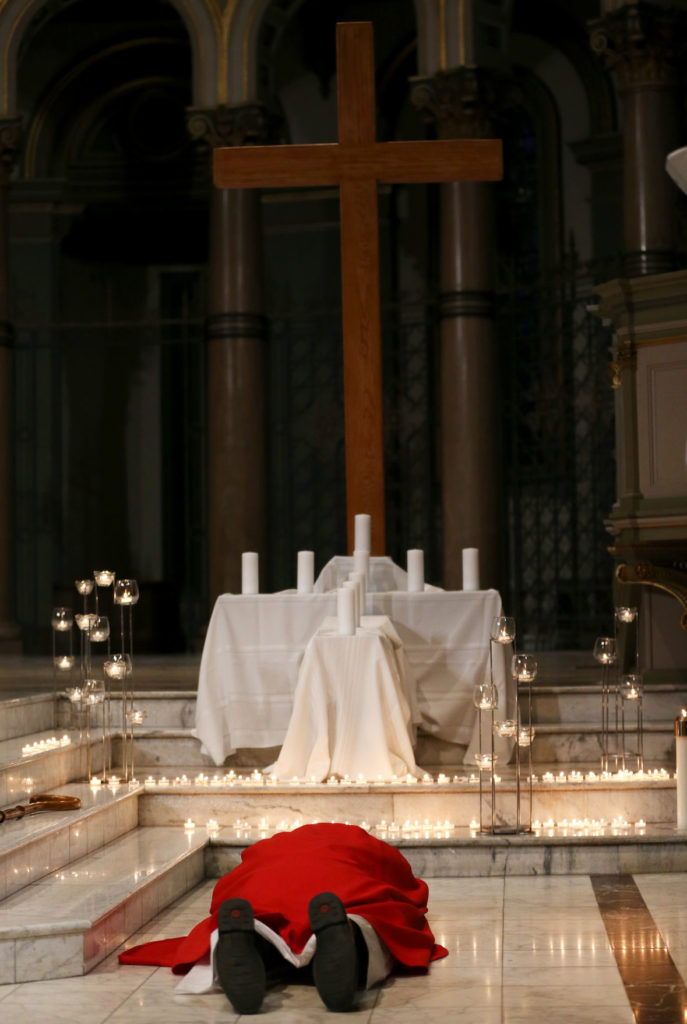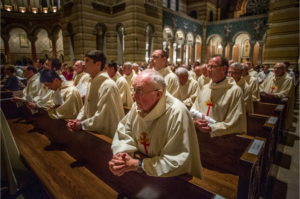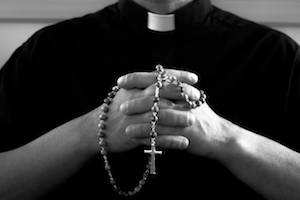On Forgiveness, Clergy Abuse, and the Need for New Understandings
What should survivors do when the Church asks them for forgiveness?
 In March of 2019, the Catholic archbishop of Hartford, Connecticut, decided that a dramatic public statement needed to be made about the 48 priests in his diocese who had been accused of sexual abuse. Archbishop Blair held a special “Mass of Reparations,” during which he told the congregation that he was there to ask forgiveness “especially of all the victims of sexual abuse and their families. I ask it for all the Church leadership has done or failed to do,” and he prostrated himself in a gesture of repentance. It was a vivid moment that received national press attention. But for many victims and their allies, it was just that: a moment.
In March of 2019, the Catholic archbishop of Hartford, Connecticut, decided that a dramatic public statement needed to be made about the 48 priests in his diocese who had been accused of sexual abuse. Archbishop Blair held a special “Mass of Reparations,” during which he told the congregation that he was there to ask forgiveness “especially of all the victims of sexual abuse and their families. I ask it for all the Church leadership has done or failed to do,” and he prostrated himself in a gesture of repentance. It was a vivid moment that received national press attention. But for many victims and their allies, it was just that: a moment.
For decades, Catholic dioceses throughout the country have had to embark on what can only be described as apology tours, during which clergy have again and again asked abuse victims for forgiveness. Nick Ingala, from the lay activist group Voice of the Faithful, told the New York Times that Archbishop Blair’s Reparations Mass was not going to be enough for many victims. “Apologies,” Ingala said, “will only go so far. Where is the responsibility? The accountability? You can’t say ‘I’m sorry’ over and over and over again.” Among the reader comments on the New York Times article, one of the most upvoted was from “Janet,” who stated that “apologies are fine,” but that “nothing, absolutely nothing, ever compensates enough for the heart-heavy, dirty-soul feeling that remains with [victims] until we die.”
While clergy abuse is not my primary focus as a journalist who writes about the Catholic Church, it is one that my colleagues and I have been forced to return to many times as continued revelations of abuse surface. In fact, every person who writes about the Catholic Church is a de facto reporter on abuse. Journalists often become victim advocates simply because we are the first people victims think to contact, especially when distrust of diocesan offices and the Church hierarchy is at an all-time high.

Mass of Reparation in St. Louis
But in spite of the many cases of abuse coming to light around the world, the clerical impulse to plead for forgiveness, and what that does to victims, has rarely been discussed. In 2018, I pitched a story on the role of forgiveness in clergy abuse to a Catholic magazine for which I occasionally write. My hunch was that, like many of the women who were being asked to forgive abusive men as #MeToo revelations unfolded, many victims of clergy abuse might be hesitant to grant forgiveness to those who had violated them because of the corrosive nature of trauma.
Assuming that Catholics had written widely on clergy forgiveness, I spent a month researching the article. Yet I struggled to find any Catholic sources that specifically addressed what clergy abuse victims should do when the Church asks them for forgiveness. In fact, I found nothing. When my primary sources turned out to be mostly female Protestant clergy and Jewish rabbis who proposed that victims do not owe their abusers forgiveness, I probably shouldn’t have been too surprised when the Catholic magazine I wrote this article for decided not to publish it. Their concern was that the article would be perceived as anti-Catholic because, they insisted, Jesus tells his followers they need to forgive anyone who has wronged them. Although I later published the article in an interfaith magazine, the experience left me wondering why Catholics talk so much about forgiveness without a deeper conversation about what forgiveness actually means for victims of clergy sexual abuse.
***
There’s no statistical information available to show how many victims forgive their abusers, nor do we really know how many abusers ask for it. Given the layers of secrecy and shame around abuse, those statistics may never emerge. But it seems appropriate to ask the question: What do we mean when we talk about forgiveness?
A little more than a year ago, I was a guest with Rabbi Danya Ruttenberg, a prominent feminist rabbi, on an episode of the Canadian Broadcasting Company religion radio show Tapestry to discuss forgiveness. Rabbi Ruttenberg said that missing from most discussions of forgiveness are conversations about atonement and making amends. In the context of clergy sexual abuse, atonement can range from financial reparations to abusers entering therapy. Before discussions of forgiveness can begin, according to Rabbi Ruttenberg, the abuser and the institution they belong to both need to demonstrate that there is no chance they will abuse again. This process is neither quick nor easy. And it is the opposite of how the Catholic Church has typically handled abusive priests and bishops.
 Atonement is the first step toward understanding that survivors do not, in fact, owe abusers anything. Abusers owe their victims much. The idea that clergy abusers should be able to ask for forgiveness and then jump back into a clerical office is one that could further damage victims. Yet most of the clerics in the Catholic Church were allowed right back into situations where they continued their abuse. Victims, re-traumatized after learning that their abusers also abused others, cannot in fact do enough healing to be capable of forgiveness because atonement never happened. Expecting people to grant forgiveness to an institution that hasn’t made legitimate amends does not suggest that institution is capable of real change.
Atonement is the first step toward understanding that survivors do not, in fact, owe abusers anything. Abusers owe their victims much. The idea that clergy abusers should be able to ask for forgiveness and then jump back into a clerical office is one that could further damage victims. Yet most of the clerics in the Catholic Church were allowed right back into situations where they continued their abuse. Victims, re-traumatized after learning that their abusers also abused others, cannot in fact do enough healing to be capable of forgiveness because atonement never happened. Expecting people to grant forgiveness to an institution that hasn’t made legitimate amends does not suggest that institution is capable of real change.
Some of the most helpful discussions about forgiveness for abuse victims come from women scholars who are also Protestant clergy. While these women are not specifically addressing clergy abuse victims, they are writing and thinking about the nature of forgiveness in the Christian tradition. Particularly when it comes to sexual abuse, cultural pressures for victims to forgive their abusers in order to be “good” Christians can become a form of spiritual abuse. In her essay “Love Your Enemy,” Karen Lebacqz writes that the work of forgiveness is a justice issue where the rights of the abused need to be seen as more important than those of the abuser. And Marie Fortune writes that in order to understand what forgiveness is, we first need to understand what it is not. Forgiveness is not, she says, “condoning or pardoning harmful behavior, which is a sin.” Forgiveness, she adds, is not “always possible.”
***
As with too many others, this is a personal story. I’m not simply a journalist who covers the Catholic Church. I’m also a survivor of sexual abuse. Although I was never abused by clergy, an abusive incident took place at the Catholic elementary school I attended. The religious order that ran the school covered it up, and it’s likely that the person responsible went on to abuse more children. For me, this issue is so important because I have experienced it first-hand and know what kind of consequences are involved for victims.
I often think of Jesus’s crucifixion scene as the root of our incomplete understanding of forgiveness. In the Gospel of Luke, Christ looks down on his killers and says, “Father forgive them, for they know not what they do.” But for the cardinals and bishops and the popes who knew – who heard and saw what abusers were doing and relocated them or covered things up – and for the priests and nuns who knew – who knew about their colleagues’ abuses and did not tell, or who were abusers themselves – forced forgiveness would be a form of spiritual abuse.
The Church can write checks to its heart’s content, bankrupt dioceses, stage Reparation Masses, build “healing gardens,” and beg for forgiveness. But until it owns up to the fact that it has not allowed adequate space for victims to express themselves, confront their abusers, and thus begin to heal, no true acts of atonement have been performed. As of today, there is still no evidence that victims owe the Church any forgiveness. The Catholic Church has chosen to protect the institution at the victims’ expense over and over again. Asking victims to forgive an institution so deeply corrupted also asks them to relive horrific and painful experiences not for their own sake, but for the sake of their abusers who need to “move on.”
Many of us who write about abuse do so because we are Catholics ourselves, and for us this is an issue of justice. As the journalist Isabel Wilkerson has said, we strive to do this work not with pity, which is looking down on someone, but with empathy, which is moving into another person’s pain. This is the same understanding that helps us to know, according to the Catholic tradition, that only a God who suffers with victims can be capable of offering any kind of forgiveness, because God takes on the burden and does the work of forgiving on our behalf. In a theology that centers victims’ experiences, forgiveness is in the hands of a God who suffers, not a responsibility resting on the shoulders of those who have been abused.
Kaya Oakes is the author of four books, most recently including The Nones Are Alright and Radical Reinvention. She teaches nonfiction writing at U.C. Berkeley. This essay was adapted from a talk given at the American Academy of Religion conference in November 2019.
***
Published with support from the Henry R. Luce Initiative on Religion in International Affairs.